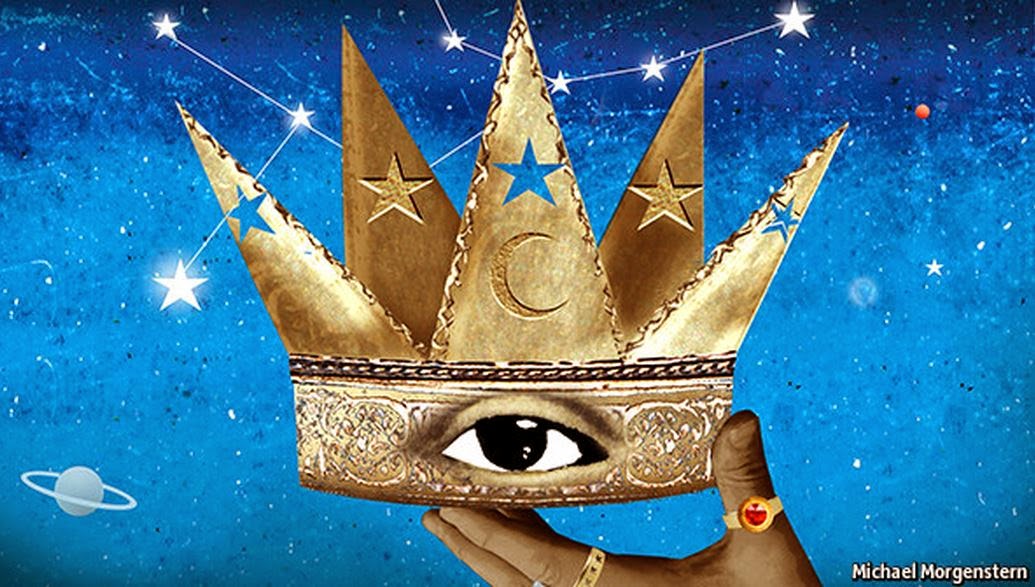 |
| From The Economist |
AN INVINCIBLE personality, a blessed man, he will win a big
victory.” In the opinion of Sumanadasa Abeygunawardena, issued from his swish
astrological headquarters in the southern port of Galle, the prospects for Sri
Lanka’s president are unambiguously bright. Percy Mahinda Rajapaksa has called
an election two years early, to seek an unprecedented third term. Why not?
Polling will happen on January 8th, and eight is a lucky number. For Mr
Rajapaksa, a Virgo, the stars are benign. Some see the president as the
fulfilment of an ancient prophecy, the reincarnation of a great southern king
(who also had combed-back hair and a lush moustache). He is destined to make
Sri Lanka prosper, says the astrologer, and will be the best friend of
Buddhism, its main religion: “There is no temple he has not visited.”
Adorned with gold rings and precious stones, Mr Abeygunawardena is in effect astrologer to the Rajapaksa court. “I very often
see the president,” he says, taking a call from the office of the First Lady
who wants an auspicious time for refitting a school. The Rajapaksas are
superstitious. Like four brothers, and his son—important politicians all—the
president, who has ruled for a decade, takes advice on such matters as when
best to step outside, or on which gems or jewellery ward off bad luck. Mr
Rajapaksa usually carries a cylindrical gold talisman, supposedly with powers
to enchant. The astrologer scoffs at this. But he says another piece of
bling—the golden amulet on a chain around the presidential neck—truly is
effective.
The president has led a charmed political life and is easily
the country’s most charismatic campaigner. Ordinary Sinhalese Buddhists (around
70% of the population) like his rural past and that he crushed Tamil
separatists in 2009, ending nearly three decades of war. Suggestions that tens
of thousands of Tamils were massacred in the process, and talk of war crimes,
are dismissed as intended only to denigrate the country. Few outside the
Tamil-dominated north and east hold the accusations against him. Drive along
miles of new tarmac around Mr Rajapaksa’s southern home, where a big new
airport and harbour have sprouted, and enthusiasm for him is obvious. Life-size
placards of his grinning figure adorn highways. In Medamulana, his ancestral
home, students tour a mausoleum to his family, with a waxworks and a hefty
gold-plated sculpture of his father’s head. Across the country there are
rebuilt railways, new houses and expanded cities.
The building splurge has piled up oodles of debt: opposition
MPs say $6 billion-8 billion are owed to China alone, though details are murky.
The government prefers perky economic statistics. Unemployment is low and GDP
is rising fast enough for Sri Lanka next year to rank as a mid-range
middle-income country with national income per person of around $4,000. Tourism
blossoms and inflation has been in single digits for 52 months, exults Basil
Rajapaksa, the presidential brother running the economy (doing himself down; it
is actually 69 months and counting). He is “very confident” about the future.
Parliament this week passed a budget crammed with goodies for voters. To the
suggestion that this was brazen populism, he chortles that “all our budgets are
pre-election ones”. The local World Bank office is perhaps even more gung-ho
about Sri Lanka’s starry economic future.
Nor is Mr Rajapaksa shy of using the benefits of incumbency,
deploying arms of government at will. A car-park in Hambantota, in the south,
is crammed with hundreds of red motorbikes, pre-election gifts for local
officials, a pattern repeated countrywide. In Tamil areas security men
intimidate politicians and activists. Even in Colombo, the biggest city,
opposition figures say they suspect spies jam their mobile phones. They are
denied public spaces for rallies. Most of the press fawns on Mr Rajapaksa;
television shows involving opposition figures go mysteriously off air. Both the
courts and electoral commission are widely seen as partisan.
All that had pointed to an easy victory for Mr Rajapaksa.
Yet those magic charms are suddenly malfunctioning. The various opposition
parties have, surprisingly, come up with a credible joint candidate.
Maithripala Sirisena, a minister until last week and leading light in the
ruling Sri Lanka Freedom Party (SLFP), defected on November 21st with a few
supporters. Ordinary Sinhalese like him, because he seems more one of them than
does Mr Rajapaksa. His promise to abolish the over-strong presidency in 100
days appeals to those who fear decades of dynastic rule by the Rajapaksas.
(Older SLFP leaders have long groused about misrule by “one family”.) Mr
Sirisena can tap into public resentment of worsening corruption. Businesses
often complain that only insiders win official contracts. Sri Lanka fell 14
places this year in the World Bank’s ranking of the ease of doing business.
Third time less lucky
Moreover, the economy is not inevitably a vote-winner. Every
voter Banyan met in the south grumbled about living costs, notably about pricey
rice and milk. A former two-term president, Chandrika Kumaratunga, back in
Colombo to help Mr Sirisena, accuses Mr Rajapaksa of being a “racist”
Tamil-hater, and adds that those official inflation figures are “trumped-up”.
As for mid-income prosperity, an opposition MP says officials dare not publish
a figure from a new survey of household spending showing real incomes, after
inflation, up by only 3% since 2006.
Mr Rajapaksa’s popularity is slipping. The SLFP won
provincial elections in the southern province of Uva in September less
comfortably than expected. At the last presidential poll in 2010, soon after
the war, Mr Rajapaksa took 57% of the votes (less if you accept claims of
modest rigging), so not a landslide. Assume that Tamils, Muslims and
Christians, who are 30% of the electorate, mostly prefer Mr Sirisena, then even
a third of the Sinhalese vote could swing it in his favour. The stars still
probably favour the president, but horoscopes often disappoint.

No comments:
Post a Comment